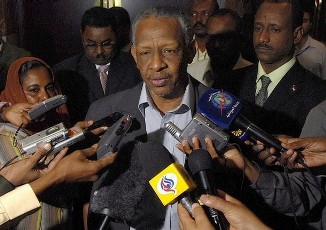NCP leaders discuss economic situation amid talk of lifting subsidies
September 4, 2013 (KHARTOUM) – The leadership council of Sudan’s ruling National Congress Party (NCP) headed by president Omer Hassan al-Bashir met until the early morning hours of Thursday to discuss the country’s economic situation amid reports that the government is close to kicking off another round of subsidy cut on fuel.

The NCP’s deputy chairman, Nafie Ali Nafie, said they were briefed on a report from the party economic sector and its five committees that were last year tasked with providing insights and analysis of the economic situation and the challenges faced in various fields in order to provide recommendations.
Nafie said they asked the economic sector for ideas on what measures could be undertaken to help improve the balance of payments, as well as policies to increase production for next year.
The NCP leadership council also asked for the development of precise details on the proposed program in the form of a matrix that would later be presented to them for further discussions.
Nafie said that economic reform is now easy to attain in light of the good rainfall and improved relations with South Sudan.
The senior official made no mention of plans to further remove fuel subsidies as was mentioned by some of his peers last week as an inevitable move.
The governor of Sudan’s central bank, Mohamed Khair al-Zubeir, was quoted by pro-government Akhbar Al-Youm newspaper on Sunday as saying that the decision to remove fuel subsidies could happen at any moment now.
Al-Zubeir noted that Sudan imports petroleum worth $4.1 billion which he said never happened in the history of the country before.
Unlike Nafie, he warned that the economic picture is unlikely to change in the next three years and will be contingent upon boosting oil production.
The central bank governor stressed that the balance of payment had reached a critical stage with imports currently at $8 billion, which is twice its export figures.
In separate statements, the finance and national economy minister, Ali Mahmood Abdel-Rasool, revealed that Sudan sells oil for $49 a barrel while buying it for at least $100, adding that subsidies often go to undeserving people and the whole system needs restructuring.
Sudan lost 75% of its oil reserves after the South became an independent nation in July 2011, denying the north billions of dollars in revenues.
Prior to the country’s breakup, Sudan produced close to 500,000 barrels, with its output now limited to 140,000 barrels per day. Oil revenue previously constituted more than half of Sudan’s revenue and 90% of its exports.
Under cooperation deals signed between Khartoum and Juba, the latter is required to pay a fee to the Sudanese government for the use of its pipelines and oil installations in exporting its crude.
Following South Sudan’s independence in July 2011, Khartoum was forced to introduce a contractionary budget that saw the partial lifting of fuel and food subsidies which triggered rare but small demonstrations across the country.
The government defended the measures, saying that the country can no longer afford to pay for the subsidies.
The World Economic Outlook (WEO) released by the International Monetary Fund (IMF) last April revealed Sudan’s economy shrunk by -4.4% last year.
In 2013, Sudan is expected to achieve a 1.2% growth which is higher than the -0.6% projected by the IMF last year. Meanwhile, next year’s GDP is forecast to stand at 2.6%, slightly better than the 2.1% predicted in the IMF’s last assessment of Sudan’s economy.
(ST)
